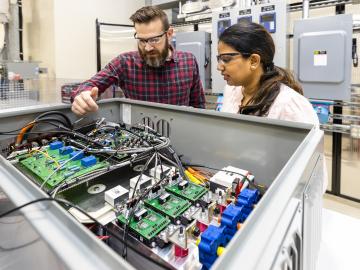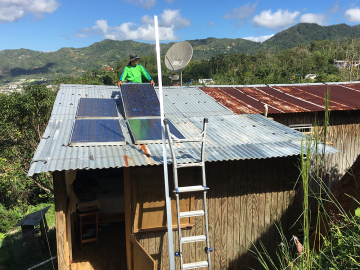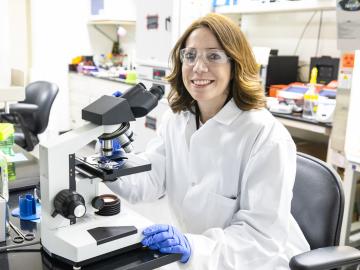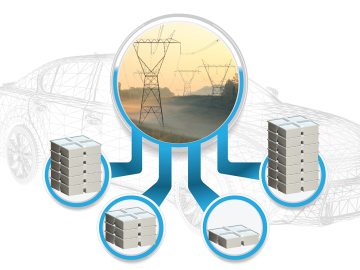
Filter News
Area of Research
- (-) Biology and Environment (83)
- (-) Energy Science (82)
- (-) National Security (16)
- Advanced Manufacturing (7)
- Biological Systems (1)
- Biology and Soft Matter (1)
- Computational Biology (2)
- Computational Engineering (1)
- Computer Science (4)
- Electricity and Smart Grid (2)
- Fusion and Fission (20)
- Fusion Energy (9)
- Isotopes (9)
- Materials (60)
- Materials for Computing (11)
- Mathematics (1)
- Neutron Science (79)
- Nuclear Science and Technology (30)
- Nuclear Systems Modeling, Simulation and Validation (1)
- Quantum information Science (7)
- Sensors and Controls (1)
- Supercomputing (58)
- Transportation Systems (1)
News Type
News Topics
- (-) Biomedical (15)
- (-) Environment (105)
- (-) Grid (33)
- (-) Materials Science (17)
- (-) Neutron Science (5)
- (-) Nuclear Energy (5)
- (-) Quantum Science (2)
- (-) Space Exploration (3)
- 3-D Printing/Advanced Manufacturing (47)
- Advanced Reactors (2)
- Artificial Intelligence (15)
- Big Data (15)
- Bioenergy (47)
- Biology (63)
- Biotechnology (11)
- Buildings (24)
- Chemical Sciences (8)
- Clean Water (18)
- Composites (12)
- Computer Science (36)
- Coronavirus (15)
- Critical Materials (4)
- Cybersecurity (14)
- Energy Storage (42)
- Exascale Computing (4)
- Fossil Energy (1)
- Frontier (3)
- High-Performance Computing (19)
- Hydropower (10)
- Machine Learning (15)
- Materials (20)
- Mathematics (5)
- Mercury (9)
- Microelectronics (1)
- Microscopy (11)
- Nanotechnology (6)
- National Security (25)
- Partnerships (6)
- Physics (1)
- Polymers (7)
- Security (9)
- Simulation (11)
- Statistics (1)
- Summit (10)
- Transportation (45)
Media Contacts

Researchers at ORNL are helping modernize power management and enhance reliability in an increasingly complex electric grid.

A new report published by ORNL assessed how advanced manufacturing and materials, such as 3D printing and novel component coatings, could offer solutions to modernize the existing fleet and design new approaches to hydropower.

ORNL is teaming with the National Energy Technology Laboratory to jointly explore a range of technology innovations for carbon management and strategies for economic development and sustainable energy transitions in the Appalachian region.

Stephen Dahunsi’s desire to see more countries safely deploy nuclear energy is personal. Growing up in Nigeria, he routinely witnessed prolonged electricity blackouts as a result of unreliable energy supplies. It’s a problem he hopes future generations won’t have to experience.

Scientists at ORNL have confirmed that bacteria-killing viruses called bacteriophages deploy a sneaky tactic when targeting their hosts: They use a standard genetic code when invading bacteria, then switch to an alternate code at later stages of

ORNL researchers Ben Ollis and Max Ferrari will be in Adjuntas to join the March 18 festivities but also to hammer out more technical details of their contribution to the project: making the microgrids even more reliable.
The Autonomous Systems group at ORNL is in high demand as it incorporates remote sensing into projects needing a bird’s-eye perspective.

Joanna Tannous has found the perfect organism to study to satisfy her deeply curious nature, her skills in biochemistry and genetics, and a drive to create solutions for a better world. The organism is a poorly understood life form that greatly influences its environment and is unique enough to deserve its own biological kingdom: fungi.

Environmental scientists at ORNL have recently expanded collaborations with minority-serving institutions and historically Black colleges and universities across the nation to broaden the experiences and skills of student scientists while bringing fresh insights to the national lab’s missions.

When aging vehicle batteries lack the juice to power your car anymore, they may still hold energy. Yet it’s tough to find new uses for lithium-ion batteries with different makers, ages and sizes. A solution is urgently needed because battery recycling options are scarce.


